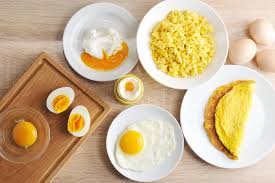Eggs aren’t just breakfast staples—they’re little powerhouses of nutrition, flavor, and versatility.
Whether you’re rushing out the door, fueling a workout, or indulging in a weekend brunch, eggs can be your secret weapon for a balanced, energizing meal. But did you know that the way you cook them can dramatically affect not just taste,
but also nutrient retention, digestibility, and overall health benefits? From preserving protein quality to enhancing flavor, mastering a few simple techniques can turn even the humblest egg into a breakfast—or any meal—that powers your day.
1. Opt for Boiled or Poached Instead of Fried
Fried eggs are undeniably delicious, but they come with hidden calories from oil or butter. A single fried egg can easily reach 90–100 calories, compared with just 68 calories for a boiled egg. Frying also introduces extra saturated fat, which may be fine occasionally but isn’t ideal as a daily habit. Boiled or poached eggs retain all their high-quality protein, B vitamins, and essential minerals without the added fat, making them a lighter, cleaner choice.
Pro tip: When poaching, add a splash of vinegar to the water—it helps the egg whites hold their shape, creating a neater, restaurant-quality result.

2. Build a Balanced Breakfast
Each egg provides about 6 grams of complete protein and all essential amino acids. Combining eggs with complex carbohydrates and healthy fats keeps you fuller for longer, stabilizes blood sugar, and provides sustained energy.
Example power breakfast:
2 poached eggs on whole-grain toast
Half an avocado, sliced
Sprinkle of chili flakes and a squeeze of lemon
This combination delivers protein, fiber, heart-healthy fats, and a burst of flavor—perfect for starting the day right.
3. Pair Eggs with Vegetables, Not Bacon
While bacon and sausage are classic breakfast pairings, they’re high in sodium and saturated fat. Vegetables add nutrients, fiber, and antioxidants without the negative effects. Spinach, mushrooms, tomatoes, bell peppers, or even roasted zucchini pair beautifully with eggs and make your meal colorful and satisfying. One cup of vegetables can double your fiber intake, improving digestion and keeping you fuller.
4. Season Lightly
Eggs have a natural savory flavor, so heavy seasoning is unnecessary. Fresh herbs like parsley, dill, or chives, a touch of black pepper, smoked paprika, or a squeeze of lemon can enhance taste without overpowering the eggs themselves. Minimal seasoning keeps the flavor delicate and allows the nutritional profile to shine.
5. Master the Perfect Boil
Timing is everything for boiled eggs:
Soft-boiled: 6 minutes, then immediately transfer to an ice bath
Medium-boiled: 7–8 minutes
Hard-boiled: 9–12 minutes, depending on how firm you like the yolk
The ice bath stops cooking instantly, prevents the green-gray ring around the yolk, and makes peeling easier.
6. Poaching Made Simple
Poaching can feel intimidating, but it’s easy once you know the steps:
Simmer water gently (avoid rolling boil) and add 1 tablespoon of vinegar.
Crack the egg into a small bowl.
Slide the egg gently into the water.
Cook 3–4 minutes for a runny yolk and set whites.
Remove with a slotted spoon and drain briefly on paper towel.
Poached eggs are perfect for avocado toast, salads, or even warming soups like ramen or miso.
7. Best Timing to Eat Eggs
Breakfast: Provides sustained energy and helps you stay full until your next meal.
Post-workout: Repairs muscles with high-quality protein.
Anytime: Eggs are versatile enough to work in snacks or light lunches.
8. Eggs Boost Brain Power
Eggs are rich in choline and B vitamins, which support memory, focus, and energy metabolism. Starting your day with eggs can improve mental clarity, alertness, and cognitive performance—a nutritional edge that many overlook.
9. Common Egg Mistakes
High heat: Produces rubbery whites and tough yolks.
Skipping the ice bath: Leads to eggs that are hard to peel.
Using old eggs for poaching: Fresh eggs hold their shape better; old eggs can spread in water.
10. Easy Egg Peeling Hacks
Use eggs that are 7–10 days old.
Ice bath for 5 minutes post-boil.
Roll gently and peel under cold running water to avoid sticking.
11. Elevate Your Eggs
Eggs can be a blank canvas for flavor experimentation:
Soft-boiled eggs in ramen or shakshuka
Scrambled eggs with turmeric, za’atar, or truffle oil
Poached eggs on sautéed greens with a drizzle of olive oil
Presentation matters. A visually appealing plate, fresh herbs, or a drizzle of high-quality olive oil can make a simple egg feel gourmet.
Conclusion
Eggs are more than a breakfast staple—they’re a versatile superfood that powers your mornings, supports brain function, and satisfies your taste buds. Choosing the right cooking method, pairing eggs with nutrient-rich ingredients, and mastering a few simple techniques can transform a humble ingredient into the centerpiece of your day.
Next time you reach for breakfast, skip the greasy pan and treat your eggs with the care they deserve—you’ll taste the difference and feel it too.
